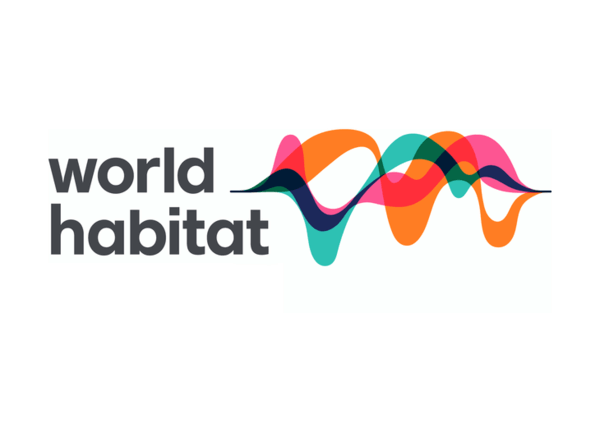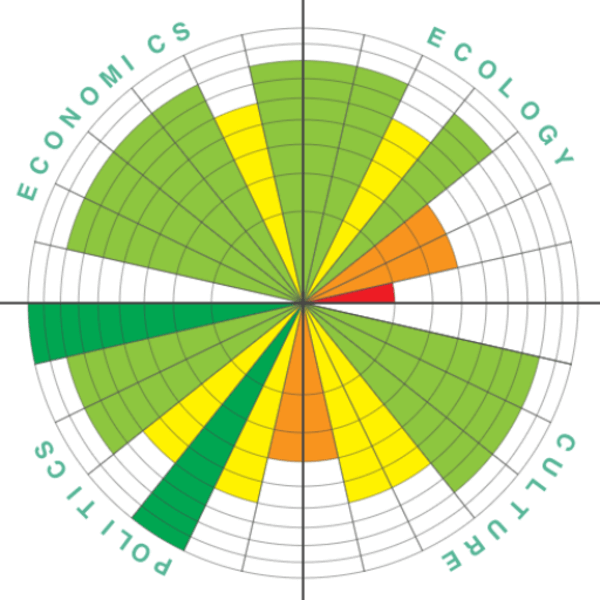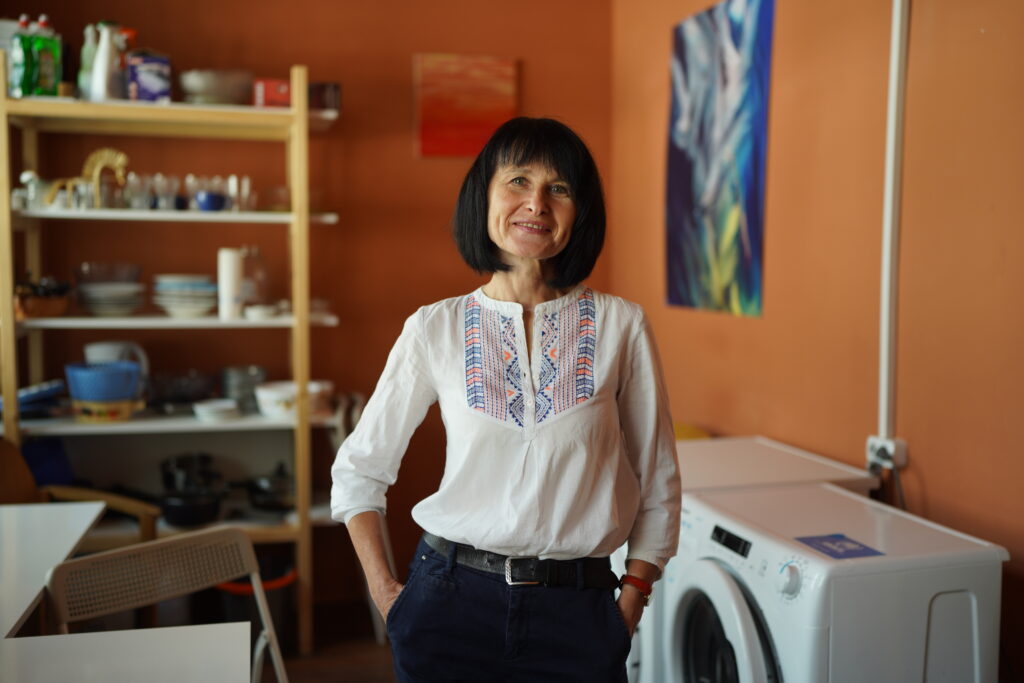 - © World Habitat Awards
- © World Habitat Awards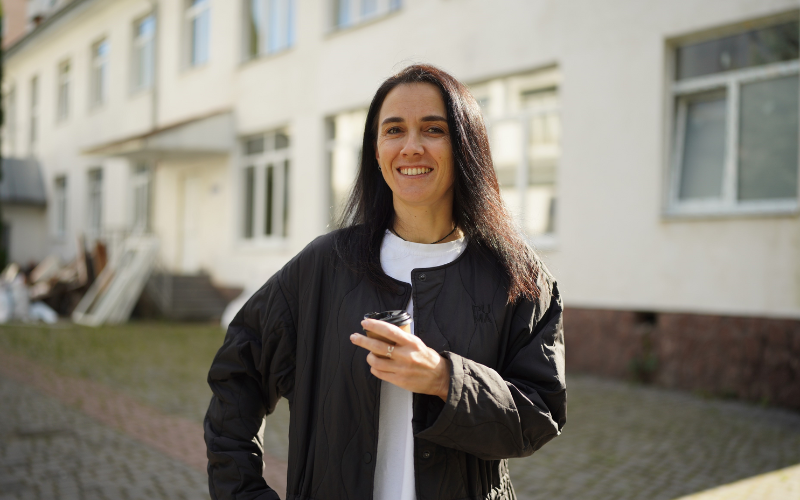 - © World Habitat Awards
- © World Habitat Awards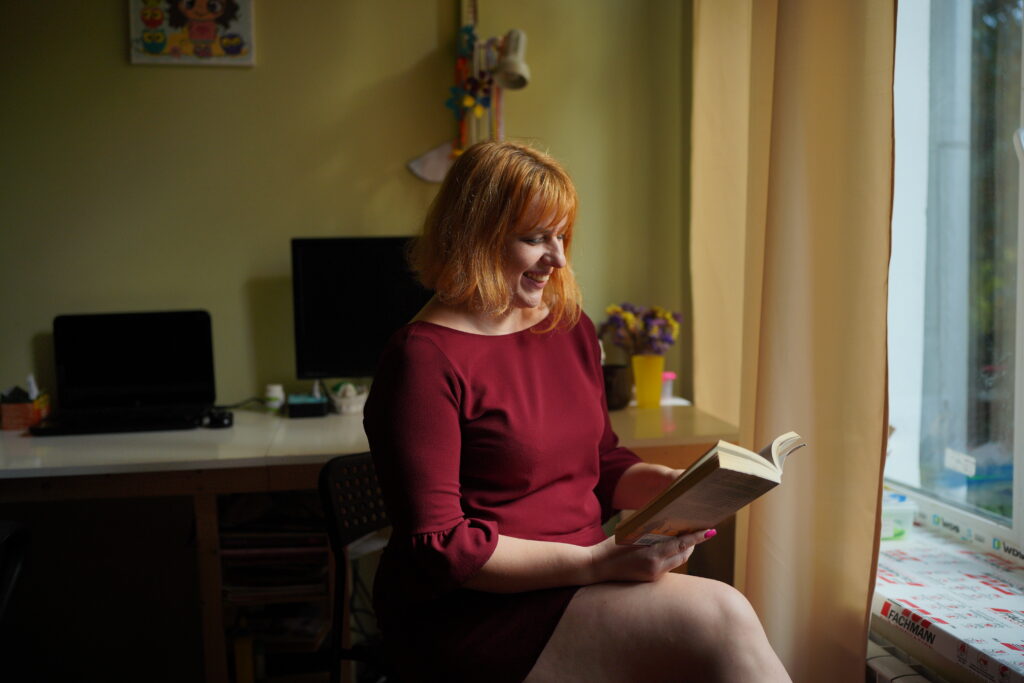 - © World Habitat Awards
- © World Habitat Awards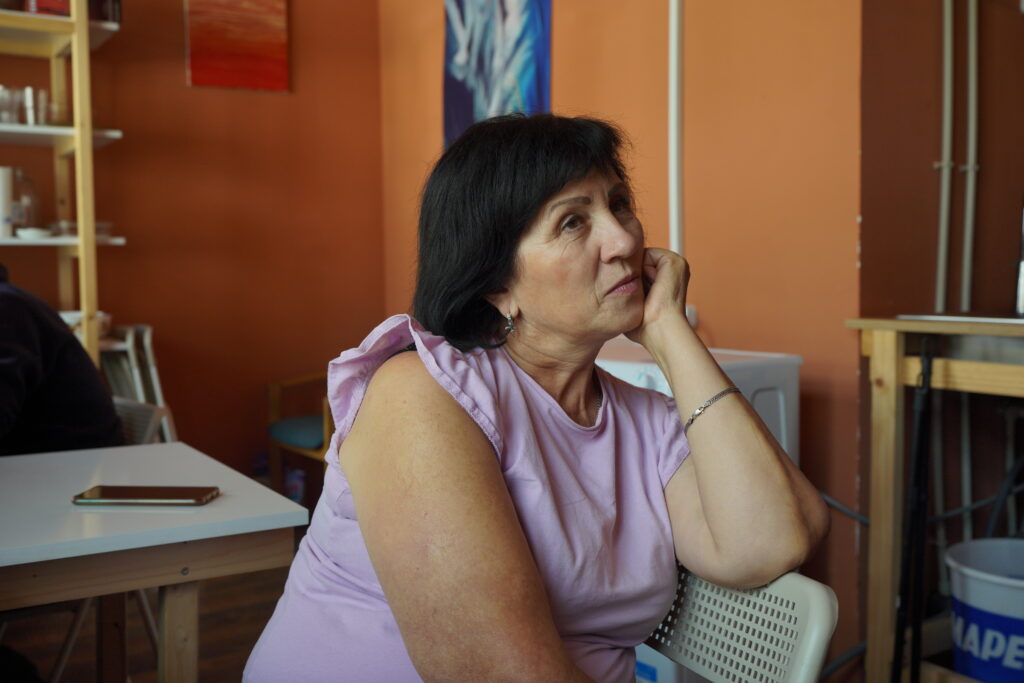 - © World Habitat Awards
- © World Habitat Awards
City
Ivano-Frankivsk
Main actors
Supranational / Intergovernmental Institutions, Private Sector, NGO / Philanthropy, Community / Citizen Group, Research Institutes / Universities
Project area
Whole City/Administrative Region
Duration
Ongoing since 2022
CO-HATY provides emergency temporary accommodation for internally displaced people (IDPs) in Western Ukraine. It works with local governments and a partnership of agencies to repair and retrofit large empty post-soviet municipal buildings into emergency interim housing.
This project, brought about by a large coalition of many organisations, has achieved substantial impact in just 12 months. While providing emergency accommodation, it works closely with IDPs to integrate them into the design process and provides necessary social support. Moreover, it has a strong environmental and sustainable angle and looks to how these buildings could be used in the long-term, indicating that there is potential for transfer in Eastern Europe.
Originally published by World Habitat and reproduced here with its permission. LINK
World Habitat Awards
This project was awarded the 'World Habitat Awards' in 2024 in the following category: Bronze.
Housing privatisation that started in 1992 in Ukraine was conducted through legislation transferring housing units to citizens (renters) ownership free of charge. As of now, approximately 95% of the housing stock is in private ownership, and only 5% is in state or municipal ownership. The housing sector is market-driven and authorities on all levels have very minor influence on the housing supply.
The Russian invasion has caused the fastest and largest displacement of people in Europe since World War II. It forced around 12 million Ukrainians to leave their homes and 6.5 million people moved to the western part of the country.
Following the invasion, the situation in the housing sector became dramatically more difficult and exacerbated inequalities in Ukrainian society. Because of Ukraine’s housing policy of private ownership over the past few decades, there is a shortage of both affordable and social housing which has left the country ill-prepared for the tide of displaced people looking for accommodation. In one western region, Ivano-Frankivsk, the number of state or municipal housing available in March 2022 was only 20 units. Not only have displaced people lost their housing but also their source of income and community. While the Ukrainian government is planning to construct new housing, there is an urgent need to quickly mobilise and house those currently displaced. Moreover, there are vacant soviet buildings throughout the country that although abandoned, have largely stayed intact.
A phenomenon specific to displacement in Ukraine has also emerged, referred to as a ‘refugee commuter.’ This means that 69% of displaced people are planning to return to their home cities, and only 11% are planning to integrate into their host communities. A considerable number of refugees have already returned to Ukraine. It provides insight into the need to create a flexible social housing stock that could help to provide them and other vulnerable groups with comfortable housing where they could stay with dignity for an undefined period.
This project aims to:
- Quickly provide temporary but community-informed and well-designed housing to people fleeing the Russian invasion in Eastern Ukraine.
- Empower people who have undergone significant trauma and provide opportunities for them to regain sense of dignity through housing.
- Reuse available buildings rather than create new housing, which is costly and environmentally unfriendly.
- Provide a possible model for developing municipal social housing in the post-conflict period.
There are four main pillars to this project:
- Restoration and renovation: Since March 2022, four soviet-style buildings in Western Ukraine have been restored and renovated to provide comfortable housing to 680 people. Locations are selected in the city centre close to city facilities and amenities, as well as directly connected to parks and green zones. The buildings were built mostly between 1960-1980.
- Design: METALAB implement architectural and urban expertise, raise funds for repairing and furnishing, coordinate the construction process, and design furniture for retrofitted spaces.
- Partnerships: METALAB has involved a network of partners established over the past eight years, as well as engaged new partners to help them deliver housing at a larger scale. These partners (more than 25 in total) include housing non-profits, legal organisations, design studios, social services, humanitarian organisations, real estate specialists and municipal agencies.
- Participation: Residents are involved in participatory workshops to inform the design of the building and then help build future accommodation through working agreements with METALAB. This involvement helps cultivate ownership among the residents of their homes and build a community among them. Moreover, hundreds of internally displaced people (who are not residents but live in the community) also volunteer to help build, many of whom work in the built environment sector.
Key Features:
- Emergency Response: METALAB harnessed its urban design background to create a project that delivered housing quickly and effectively, while still incorporating aspects for communities that have undergone significant trauma. This can include community participation and building exercises, as well as key social and psychological support provided though humanitarian agencies. 6 Complexity Management. This project is renovating and delivering housing during conflict, meaning that it is subject to unanticipated developments that will impact the project. For example, buying materials in the initial stages of the project was challenging due to cut off supply chains. New groups continue to move into Western Ukraine with diverse needs that CO-HATY need to adjust to and accommodate. METALAB refers to this as ‘complexity management,’ where they continually manage dynamics and changes.
- Partner Mobilisation: METALAB built out a network of organisations in only a year to deliver comprehensive housing, furniture design, legal, educational and social services. Partners include Insha Osvita, New Housing Policy, Izolyatsia, New Democracy Fund, Everlegal, “Critical Thinking,” “Second Home If,” Perembli, TOLOCAR, Building Ukraine Together (BUR), the State’s educational institution (Podilskyi Center of Professional Technical Education), IvanoFrankivsk Professional Construction Lyceum, Parasolka, DUG, Hearts for Ukraine, Ukrainische Engel, Ro3kvit, BRDA (OKNO), Re-Win, Caritas Ukraine, and Association of Real Estate Specialists of Ivano-Frankivsk, among others. This project has mobilised more than 25 partners in total.
- Community Participation: This project prioritises and hinges on the participation of displaced people in both the design and delivery of the housing. Some residents (not all) were involved in a set of participatory design workshops in the CO-HATY collective centre, which included residents with specific needs, such as pensioners, families with children and people with disabilities. Residents work together to build community life by cleaning the area, planting gardens and planning shared social activities. CO-HATY also involves and contracts displaced people to work on the construction and delivery, all of whom have a background in the field. Following construction, these same people will help manage the space and help maintain it in collaboration with communal city enterprises.
- Resident Selection: The selection of residents to live in the building depends heavily on its ownership of the building that is being retrofitted and renovated. In most of the cases it reflects on the public administration strategy of providing accommodation, so is decided by Ivano-Frankivsk and Khmelnytskyi administrations. For example, in Kindergarten (Sadok), settlement lists were created by the regional government and CO-HATY had minimal influence on who would live there. Their influence primarily comes in the selection of volunteers to work on the buildings. No information has been provided on housing marginalised communities within the displaced population, including the Roma and LGBTQI+ community.
CO-HATY is a project created by non-profit organisation and urban laboratory METALAB in Ivano-Frankivsk, Ukraine. METALAB advocates for a city that is socially equal, spatially more comfortable, culturally richer, ecologically responsible and economically balanced. It aims to create a favourable environment for creativity where social-spatial ideas for a city can develop and be tested.
METALAB cofounded CO-HATY with Urban curators, which is an independent agency and an interdisciplinary team from Kyiv that works on projects intersecting space, community, identity and dialogue.
The total cost of CO-HATY is 34,158,873 UAH ($923,811 USD), primarily from grants and charitable donations (listed below). Each building costs the following:
Pilot Project in Ivano-Frankivsk: 5,176,941.00 UAD ($140,000 USD)
- Residents: 170
- Size: 2,300sqm
- Renovation time: six weeks
- Funders: Largely volunteer based project with volunteer organisation “Second Home If.” Received funding from IM Swedish Development Partner, MitOst, Raumpioniere, Danish Refugee Council, and local communities from different parts of the world. Most of the funding was collected online from personal charitable donations.
Kindergarten (Sadok) in Ivano-Frankivsk: 9,244,537 UAH ($250,000 USD).
- Residents: 140
- Size: 1,896 sqm
- Renovation time: four and a half months
- Funders: Department of Education and Science of Ivano-Frankivsk City Council provided the building; “Ukraine Confidence Building Initiative,” funded by United States Agency for International Development (USAID); International Organization for Migration (IOM Ukraine) bought materials for heating, electrical systems doors, bathroom tiles; Rokada, People in Need and Polish Aid donated household appliances and items; Peace of Mine provided support to install windows.
Hotel in Ivano-Frankivsk: 10,353,882.00 UAH ($280,000 USD).
- Residents: 80 Size: 1,132 sqm
- Renovation time: nine months
- Funders: German Federal Foreign Office in partnership with the humanitarian organization Sign of Hope, IM Swedish Development Partner, and the Association of Real Estate Specialists of Ivano-Frankivsk.
Dormitory in Zinkivtsi village: 23,296,234. UAH ($630,000 USD) (more funding was required as the dormitory had not been used for 20 years)
- Residents: 250 Size: 3,200 sqm
- Renovation time: seven months
- Funders: German Federal Foreign Office with the humanitarian organization Sign of Hope. Sanitary ware and furniture donations were provided by the RE-WIN organisation and a housing cooperative in Zurich.
The CO-HATY team have confirmed funding from the German Federal Foreign Office in partnership with humanitarian organisation Sign of Hope to renovate another dormitory this year. They are also currently negotiating with the United Nations to become a partner for the provision of emergency shelter, durable housing and adequate accommodation for internally displaced people which they are hoping will provide access to further funding.
Finally, they are working with the City of Ivano-Frankivsk on their strategy which may lead to more sustained support within a municipal budget. This project is reliant on future funding streams and continues to fundraise for grants and donations, which is common in conflict-afflicted countries.
Financial
- Mobilised a diverse network of funders and charitable donations to secure almost a 6,755,240 UAH ($1,000,000 USD) to restore and renovate emergency housing for people who had lost their homes due to the Russian invasion.
- CO-HATY contracts displaced people to work on the construction and management of the buildings, which helps with their economic reintegration into society. Three internally displaced people are now employed by the Ivano-Frankivsk municipal government and communal enterprises as shelter managers. Moreover, those in the centres are provided with professional opportunities through volunteer work and activities through project TOLOCAR’s maker space.
- Supports local businesses and production, including production of 70 beds designed by CO-HATY in cooperation with a local team. METALAB also ordered 500 pieces of modular furniture from local companies.
Social
- This project has housed over 640 people in a collective housing model where they have their own units but share communal living spaces to build a sense of community.
- METALAB promotes the right to decent housing for displaced people by designing community-informed, high quality living environments over the standard temporary shelter often provided in conflict contexts.
- Internally displaced people who otherwise would be isolated, particularly when being forced from their communities and homes, are integrated into a new community of others with similar experiences and undertake shared activities, including gardening, social events and house cleaning.
- Residents are motivated to participate in design and delivery process through different instruments, including showrooms where they can see future accommodation and give feedback; mapping; photo observation; collages; and modelling with lego. It cultivates creativity and encourages people to express themselves. people feel a sense of empowerment from the above process, which is further complemented with other creative activities such as a fashion shoot (see in pictures attached).
- Volunteers – many of whom had a background in construction, urban design, architecture – can apply their skills to the construction and management of the new buildings. Five have also become staff members of the CO-HATY team.
- METALAB is in a working group with the City of Ivano-Frankivsk to inform their municipal strategy on urban development and integration, including the transition of an emergency housing project into a social housing development programme across Ukraine.
Environmental
- CO-HATY saves almost 50% embodied carbon by repairing abandoned buildings rather than constructing anew.
- Furnishes homes with charitable donations of second-hand furniture, kitchen items and other housing-related items.
- METALAB uses its own construction facilities and other local suppliers to produce any new material for furniture or to collect materials for construction. The materials are locally sourced, so METALAB reduces its carbon footprint by not importing materials from abroad.
Evaluation
METALAB evaluates the success of this project according to the following criteria:
- Number of buildings restored and renovated
- Number of internally displaced people relocated to better housing
- Attendance to community group meetings
- Number of successful job applications
METALAB produces monthly reports, the most recent of which are listed here: January, February, March, April. These results largely discuss the restoration works that were undertaken on the building; the community activities worked on (i.e., garbage cleaning, garden planting); funds received; and cost structure.
METALAB is currently putting together a yearlong study of community life, which will compile diaries kept by community managers and shelter administrators on community life in the buildings. It will look at the functioning of the building; the features of interaction between residents of the shelter; and their conclusions on improvements needed on certain processes.
The Russian invasion of Ukraine forced around 12 million Ukrainians to leave their homes and 6.5 million people moved to the western part of the country. However, due to housing policy in the past few decades, there is a shortage of affordable temporary housing.
The barriers this project faced were primarily due to the Russian attacks on the energy system in Ukraine as METALAB’s construction site experienced many power outages in November and December 2022. As a result, the renovation process was significantly slowed down. To adapt METALAB partially switched to non-electrical tools; its construction team used LED lamps and flashlights to work; and they also switched to battery-powered tools in some instances. The Ivano-Frankivsk Regional Military Administration and two other polish partners supplied generators to cover electrical needs.
METALAB involved municipal communal enterprises to help replace entire heating systems as the buildings themselves are old and require substantial service alterations.
The other challenge is to do with adjusting the architecture of the buildings to the demographics of residents, paying close attention to age, number of family members and children. METALAB has done significant work to change the planning of the floor layout and implemented a BIM4 system into the design process, shifting their approach towards flexible design.
Finally, as more members of the METALAB team join the military, the organisation headhunts to react to these staffing challenges while prioritising supplying jobs to those who need it, including the displaced community.
CO-HATY has received the following visitors:
- Local politician and German political scientists Bürgermeister Michael Schubert with Potsdam delegation
- Izolyatsia Network
- Ro3Kvit
- New Housing Policy
- People in Need, Czech Republic
- Save the Children
- Doctors without Borders
- TOLOCAR
- Cadus
- International Organisation for Migration (IOM)
- Consulate General of the Republic of Poland and Diplomat Eliza Dzvonkiewicz
- Baza
- Leave No one Behind, Germany
CO-HATY is currently scaling up in Ukraine with its plan to convert another dormitory in 2023. It hopes to restore another three dormitories after that and is currently looking for funding. Its potential to scale is indicated by the renovation of four buildings in just a year (March 2022-March 2023). In the longer-term, it hopes to renovate around 15 buildings in total that are then transitioned to social housing in the post-conflict phase. METALAB is realistic about its limited ability to scale up quickly to tackle the millions of displaced people in Ukraine. However, it increasingly works with organisations 12 that assist internally displaced people at scale, including Moving Ukraine and GIZ. Organisations working with internally displaced people are now entering the housing finance field in the Ukraine and have the potential to impact the housing market. There is an increased perceived risk of long-term investment in housing for individual households, as well as large scale impoverishment. New institutional actors are looking at long-term investments in non-profit rental housing, such as the European Investment Bank and the Council of Europe Development Bank.
As such, METALAB is integrating itself into international-led housing and applied for the Shelter Cluster to contribute its learnings and advocate its alternative housing model.
Internationally, METALAB believe that CO-HATY's experience could be useful in contexts where housing policies have largely favoured private ownership and/or are undergoing crisis situations. It could also be applied in urban centres currently undergoing rapid urbanisation and migration, where local authorities are not able to respond to the challenge alone.
The most favourable contexts to transfer would likely be to those with experience in informal housing construction with minimal resources to build individual housing. Finally, the model could provide useful lessons on how to activate different people across the housing, civil society and humanitarian sectors to respond to a crisis, particularly when functioning within a weak and low-capacity state that lacks a progressive, inclusive housing policy.
External links / documents
On Map
The Map will be displayed after accepting cookie policy
